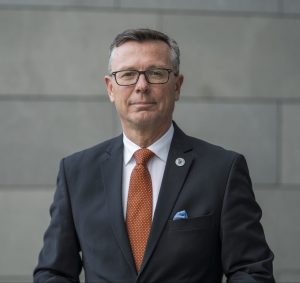Norway’s police intelligence agency PST has now charged a guest researcher at the University of Tromsø with illegal intelligence gathering, and claims to have his real identity. He’s been held at an internment center pending deportation this week, but is now heading for jail after all.

The man who was arrested in Tromsø earlier this week hasn’t appealed either his internment or pending custody but continues to deny any criminal offense. PST (Politiets sikkerhetstjeneste), however, believes he’s guilty of espionage that could threaten national security.
The spy suspect still claims he’s a Brazilian citizen but Norwegian Broadcasting (NRK) reported Friday afternoon that state prosecutors now believe they have his real identity. They claim the researcher known at the University of Tromsø as José Assis Giammaria is actually Mikhail Valerjevitsj Mikusjin, born in Russia in 1978 and working in Norway on assignment for Russian authorities. He’s earlier thought to have been 37- or 40 years old. Now PST thinks he’s 44, and they’ve formally charged him under the criminal paragraph 121: illegal information-gathering that can damage fundamental national interests.
The investigative network Bellingcat, working with Norwegian newspaper VG, further reported that the identity now tied to the spy suspect, Mikhail Valerjevitsj Mikusjin, belongs to a colonel in Russia’s intelligence agency GRU. Newspaper Aftenposten has also reported seeing information that links the man to GRU. A court in Oslo ordered him held in custody for at least another four weeks, while Norwegian police continue their investigation. Giammaria/Mikusjin did not appeal the order Friday afternoon.
He’s being held as a so-called “illegalist,” sometimes called “super spies” because they’re known to operate undercover over long periods of time, can infiltrate organizations and then open doors for colleagues to facilitate intelligence gathering, and can be “extremely well-trained agents.” Illegalists build up identities as ordinary citizens, while working undercover for foreign intelligence agencies.
PST prosecutor Thomas Blom told NRK that suspicions against him rose when he chose to answer questions in English at his first custody hearing in Tromsø earlier this week, even though the court had arranged for a Portuguese interpreter. Portuguese is the main language spoken in Brazil.
His background remains highly unclear. Newspaper Aftenposten reported on Friday that the suspect had told colleagues at the University of Tromsø (UiT The Arctic University of Norway) that he speaks Spanish (instead of the Portuguese spoken in Brazil) because his mother died and he grew up in Bolivia. That’s remarkably similar, according to Aftenposten, to what another Russian spy suspect in the Netherlands told authorities earlier this year before he was deported and jailed in Brazil for falsifying documents.
Norwegian police have been unable to find any record of him in a Brazilian register of academics, reports Aftenposten, nor could he be found in the Brazilian court register or the Brazilian university register. He can claim, however, that he studied in Canada: He holds a bachelor’s degree from Carleton University in Ottawa (where he also worked on the election campaign of a political candidate) and a master’s degree from the Center for Military, Security and Strategic Studies in Calgary. He received his master’s degree in 2018. In 2019 he published an article on the advantages Canada could have with military bases in Arctic areas.
He arrived at UiT in Tromsø late last year after, reports NRK, being turned down for an unpaid guest researcher post at the University of Bodø, where Norway’s fighter jet fleet was based for many years. His main task at UiT, according to Professor Gunhild Hoogensen Gjørv, was to study security in the far north and re-work his master’s degree into an article and then study for a doctorate degree. “This was self-financed from his side,” Gjørv told Aftenposten, something which is not considered unusual in academic circles.
Gjørv, who leads an open-source project about hybrid threats called “The Grey Zone” in Tromsø, said the man didn’t have access to any classified information. She acknowledged, though, that simply being in Tromsø and part of its university milieu can have given him deeper understanding of conflicts and debates in the far north. She told NRK that “he came to us because of his interest in major questions around security in the north.”
Norway’s foreign ministry has been trying to tighten control over international researchers at Norwegian universities, especially those who engage in research that can strengthen other countries’ military capabilities. The universities themselves have resisted proposed restrictions, wanting to provide researchers with as much academic freedom as possible.
PST, meanwhile, has warned for many years of potential Russian-, Chinese- and Iranian intelligence gathering in Norway. Several Iranian researchers have been legally challenged over their work at Norwegian universities, leading to conflicts with the educational institutions who want to nurture an international environment and fear a “brain drain” of foreign talent.

UiT Rector Dag Rune Olsen told Aftenposten that Norwegian universities including UiT “often have researchers who cooperate with researchers in non-allied countries.” He noted that it’s “easy to understand that we must regulate how we share knowledge with countries outside our security alliance,” but that can also present academic dilemmas.
Olsen said the arrest of their guest researcher has affected colleagues at the university. “It’s not that any data has been stolen or that information has been gathered that could damage our research,” he told NRK, “but what’s demanding for us is that this can undermine the legitimacy of our professional milieu.” Several of the alleged spy’s colleagues at UiT have said they’re “shocked” by his arrest and the charges now against him.
“There’s now reason to believe that we need to start thinking differently in order to protect ourselves,” Olsen told NRK. “We have a good dialog with PST and will continue with that.”
NewsinEnglish.no/Nina Berglund

